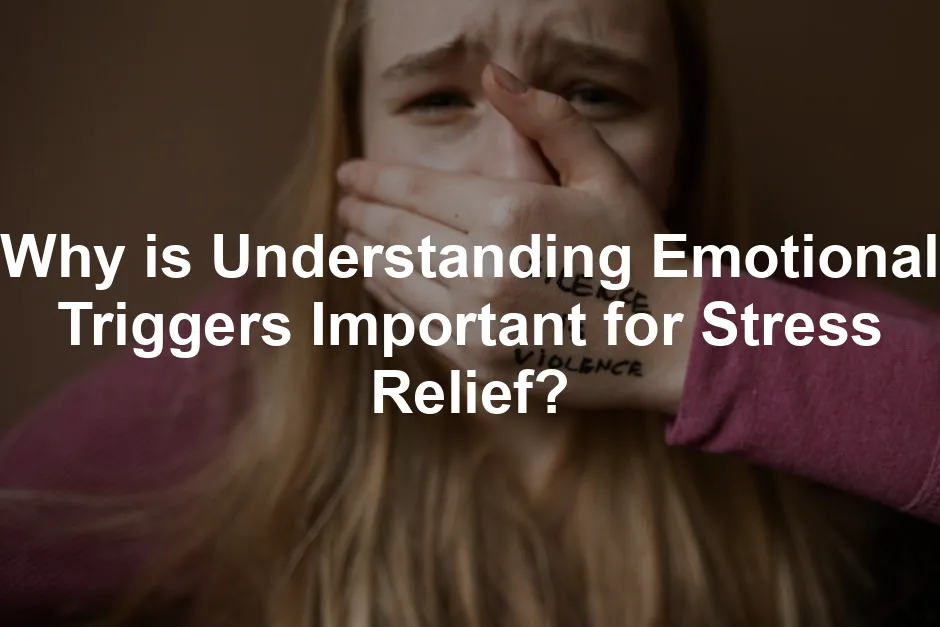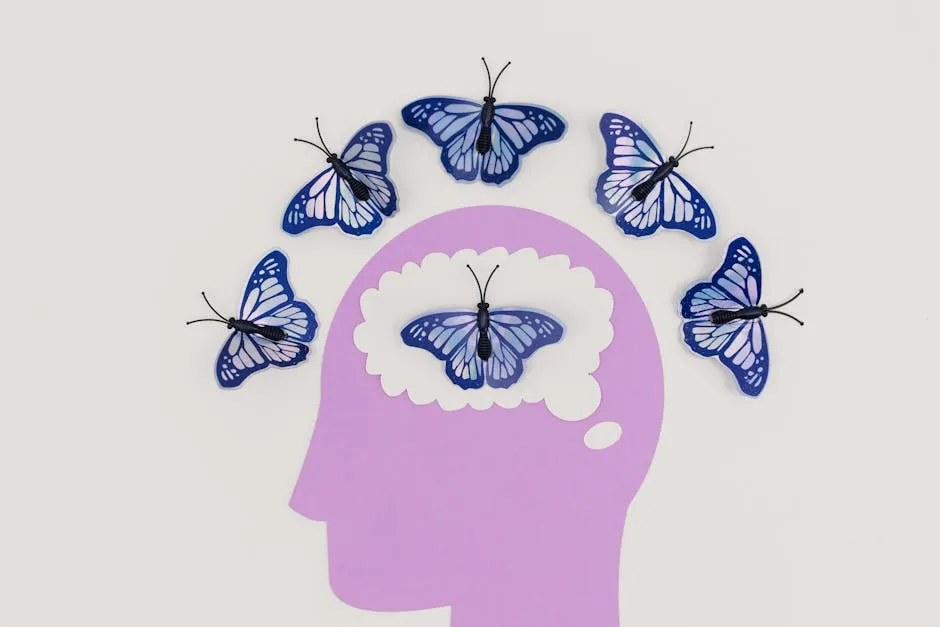
Why is Understanding Emotional Triggers Important for Stress Relief?
Introduction
In a world where stress seems to be the only constant, our emotional triggers can be the sneaky culprits behind our heightened responses and overwhelming feelings. Picture this: you’re having a perfectly fine day until someone makes a passing comment that sends you spiraling into a storm of emotions. Welcome to the world of emotional triggers! Understanding these triggers isn’t just a therapeutic buzzword; it’s a superpower that can help you reclaim your peace of mind.
Recognizing and processing your emotional triggers is vital for effective stress relief. When you know what sets you off, you can respond thoughtfully instead of reacting impulsively. This awareness arms you with the tools to foster emotional intelligence and resilience. Think of it as your personal stress management toolkit!
Speaking of emotional intelligence, if you really want to dive deep into understanding and improving this essential skill, grab a copy of Emotional Intelligence 2.0 by Travis Bradberry. This book is like a roadmap to emotional mastery, helping you navigate those tricky waters of feelings and reactions.
Let’s face it: life throws curveballs. Sometimes, those curveballs come wrapped in emotions we didn’t expect. By understanding your emotional triggers, you can take charge of your reactions. This article will explain why recognizing and understanding your emotional triggers is essential for effective stress relief. So, let’s embark on this enlightening journey to discover how knowing your triggers can transform your stress management game!
In this blog post, you’ll learn about the nature of emotional triggers and their impact on stress. You’ll discover how to identify your triggers and develop coping strategies to manage them. By the end of this article, you’ll be equipped to navigate your emotional landscape and build a more resilient, stress-free life.

Understanding coping strategies is crucial for managing emotional triggers effectively. Learn more about coping strategies here.
Summary
Understanding emotional triggers is crucial for stress relief as it fosters self-awareness, improves relationships, enhances decision-making, reduces stress, and increases resilience. Triggers, whether linked to past traumas or daily stressors, can evoke intense emotional responses that might seem disproportionate to the situation at hand. By recognizing these triggers, individuals can develop healthier coping strategies that allow them to respond thoughtfully rather than react impulsively.
In this blog post, we will explore:
- What emotional triggers are: Definitions and examples of emotional triggers that may arise from past experiences or current stressors.
- The connection between triggers and stress: How unmanaged triggers can lead to chronic stress and impact mental and physical well-being.
- Identifying your triggers: Practical strategies to help individuals recognize their own emotional triggers, including journaling and self-reflection techniques.
- Coping mechanisms: Practical tips and strategies for managing emotional triggers to reduce their impact on daily life, such as mindfulness and communication techniques.
- Understanding the science behind triggers: Insights into how our brain processes triggers and the emotional responses they evoke.
By the end of this article, you will have a comprehensive understanding of how recognizing your emotional triggers can lead to effective stress relief and a healthier emotional life.

Understanding Emotional Triggers
What Are Emotional Triggers?
Emotional triggers are stimuli that provoke intense emotional reactions. They can be memories, events, or specific phrases that spark feelings—often unexpectedly. For instance, a song might remind you of a breakup, leading to sadness. Or, a scent may evoke warm memories of a loved one, bringing joy.
Past experiences play a significant role in shaping these triggers. If someone faced rejection in childhood, a simple comment about their work might trigger feelings of inadequacy. This connection to past events shows how our emotions are intricately woven with our histories.
Triggers can also vary widely among individuals. What triggers one person may not affect another. For example, someone might feel anxious around crowds due to a past trauma, while another person might thrive in social settings. Understanding these unique differences is crucial for emotional growth.
Recognizing triggers is the first step towards managing them. Without this awareness, individuals may find themselves reacting disproportionately to situations, often leading to stress and turmoil.

How Do Emotional Triggers Affect Us?
Emotional triggers can elicit both psychological and physical responses. When a trigger is activated, the brain often responds with a fight-or-flight reaction. This response can lead to increased heart rate, shallow breathing, or even feelings of panic. These reactions can be overwhelming and contribute to a cycle of stress.
Research indicates that unmanaged emotional triggers significantly impact stress levels and overall mental health. A study found that individuals with a history of trauma often experience heightened responses to triggers, leading to anxiety and depression. In fact, nearly 70% of people report feeling stressed when confronted with their emotional triggers.
Triggers can escalate stress by causing individuals to relive past negative experiences. This reliving can create a sense of helplessness, leading to avoidance behaviors. Over time, such avoidance can contribute to chronic stress, further affecting mental and physical well-being.
Recognizing the significance of emotional triggers is vital for effective stress management. By identifying and understanding these triggers, individuals can develop coping strategies. These strategies can include mindfulness practices, journaling, or seeking professional help. Ultimately, awareness of emotional triggers fosters resilience, allowing individuals to navigate their emotional landscapes more effectively.
Understanding emotional triggers is not just a therapeutic exercise; it’s a pathway to better emotional health. By addressing these triggers, individuals can break free from the cycle of stress and cultivate a more balanced and fulfilling life.

Identifying Your Emotional Triggers
Reflecting on Past Experiences
Identifying emotional triggers starts with reflecting on your past experiences. Think back to moments when you felt intense emotions—anger, sadness, or anxiety. What were the common threads? Were there particular people, places, or situations that seemed to set you off?
One effective technique is to create a timeline of significant events in your life. Mark moments that stirred deep feelings. You might find that certain situations, like being criticized at work or being ignored by friends, consistently evoke strong reactions.
For example, if you often feel anxious during team meetings, it might stem from a past experience where your ideas were dismissed. Recognizing these themes can illuminate why you react the way you do in specific situations.
Moreover, it’s crucial to maintain curiosity about these emotions. Instead of dismissing your feelings, ask yourself: “What does this remind me of?” This reflection can reveal underlying fears or insecurities linked to your triggers.

Paying Attention to Physical Cues
Our bodies often signal emotional triggers before our minds catch up. Heightened heart rates, sweaty palms, or stomach knots can indicate that something’s amiss. Being attuned to these physical cues is essential for identifying triggers.
For instance, if you notice your heart racing when someone criticizes you, it’s a sign that you might be experiencing a trigger. Perhaps you felt similarly in childhood when faced with disapproval. Acknowledging these sensations helps you connect emotional responses to specific triggers.
Staying present and mindful of your body is key. Engage in deep breathing exercises to calm your mind and tune into your physical state. This awareness can lead to greater emotional regulation, allowing you to handle triggering situations more effectively.

Keeping a Trigger Journal
Journaling is a powerful tool for tracking emotional triggers. Start by dedicating a notebook to your emotional experiences. Each day, jot down significant events, your feelings, and any physical symptoms you experienced.
When writing, be specific. Describe the situation, your emotions, and any thoughts that arose. Over time, patterns will emerge. You might discover that certain activities, like public speaking, consistently trigger anxiety.
To enhance your journaling practice, consider rating the intensity of your emotions on a scale of 1 to 10. This grading can help you identify triggers that provoke stronger reactions.
Review your journal regularly to spot recurring themes. Perhaps you’ll find that interactions with a specific colleague always lead to frustration, or that weekends trigger feelings of loneliness. This insight is vital for developing coping strategies.
By keeping a trigger journal, you empower yourself to understand your emotional landscape better. The more you know about your triggers, the easier it becomes to manage your emotional responses and navigate challenging situations with grace.

Coping Mechanisms for Managing Triggers
Mindfulness and Meditation
Mindfulness is like a superpower for stress relief. It helps you recognize emotional triggers before they spiral out of control. By being present, you can notice when a trigger starts to bubble up. This awareness gives you precious seconds to respond thoughtfully instead of reacting impulsively.
To practice mindfulness, try deep breathing exercises. Inhale for a count of four, hold for four, and exhale for four. Repeat this a few times. You’ll feel more grounded.
Another great practice is body scanning. Lie down comfortably and mentally scan from your head to your toes. Notice any tension or discomfort. Acknowledging these feelings helps you manage them better.
Guided meditations can also work wonders. There are plenty of apps available that offer sessions specifically designed for stress reduction. Just a few minutes a day can really enhance your emotional awareness. You might want to check out gift cards for meditation apps to explore various options!

Cognitive Behavioral Techniques
Cognitive Behavioral Therapy (CBT) is a powerful tool for reframing those pesky negative thoughts tied to your triggers. Instead of letting unhelpful thoughts dictate your emotions, CBT encourages you to challenge them.
For example, when you feel triggered by criticism, ask yourself: “Is this thought true?” You might find that the criticism isn’t as harsh as it feels. Reframing it can turn a negative reaction into a constructive response.
Practical exercises can include keeping a thought diary. Write down your triggers and the thoughts that follow. Then, counter those thoughts with evidence. This practice helps you see things from a different perspective and reduces the emotional intensity associated with triggers.
Another effective CBT technique is visualization. Picture a calm scene or a happy memory when faced with a trigger. This mental shift can help you regain control over your emotional responses.

Developing a Personal Coping Strategy
Creating your personalized coping strategy is essential for managing emotional triggers effectively. Think of it as your emotional first-aid kit. Start by identifying what works best for you.
Deep breathing is a classic strategy. When feeling overwhelmed, take a moment to breathe deeply. Inhale slowly, hold, and then exhale fully. This simple technique can break the cycle of stress.
Taking breaks is another useful strategy. If you feel a trigger rising, excuse yourself for a few minutes. Go for a short walk or grab a glass of water. This pause can help you reset your emotional state.
Engaging in creative activities is also beneficial. Whether it’s painting, writing, or playing music, creativity can be a fantastic outlet for stress. It allows you to express emotions constructively and can redirect focus away from triggers. You might want to consider art supplies for creative expression to help channel your emotions!
Remember, developing your coping strategies takes time. Experiment with different methods, and don’t hesitate to adjust them as you learn what works. Each small step you take will empower you to handle your emotional triggers more effectively, leading to a calmer, happier you.

The Importance of Professional Guidance
When to Seek Help
Recognizing when to seek professional support can be as vital as understanding your emotional triggers. Some signs indicate it’s time to reach out. If you frequently experience overwhelming emotions that disrupt daily life, it might be a good idea to consult a therapist. Other indicators include persistent feelings of sadness, anxiety, or irritability that don’t seem to dissipate.
Additionally, if you find that your emotional responses lead to issues in your relationships or work, seeking help can be a game changer. A trained professional can provide valuable insights and tools to help you navigate your emotional landscape.
Working with a therapist offers numerous benefits. They create a safe space for you to explore your triggers and their origins. This supportive environment fosters healing and understanding. With professional guidance, you can learn effective coping strategies tailored to your needs. Ultimately, therapy empowers you to manage your emotions and develop healthier responses to stress.

The Role of Therapy in Understanding Triggers
Therapeutic approaches play a crucial role in addressing emotional triggers. Techniques like Eye Movement Desensitization and Reprocessing (EMDR) are specifically designed to help individuals process past traumas linked to triggers. This method has gained recognition for its effectiveness in treating PTSD and related issues.
Exposure therapy is another powerful technique used to confront and manage triggers. It involves gradually exposing individuals to their triggers in a controlled environment. Over time, this helps reduce the anxiety associated with these triggers, allowing for a more measured response.
A supportive environment is essential in managing emotional health. Therapy provides a judgment-free zone where you can express feelings openly. This connection with a professional can foster deeper self-awareness and emotional resilience. By understanding your emotional triggers through therapy, you gain the tools to navigate life’s challenges with greater ease, leading to a more balanced and fulfilling life.

Conclusion
Understanding emotional triggers is not just about personal growth; it’s about reclaiming control over your emotional landscape. By recognizing and managing these triggers, you can reduce stress, enhance your relationships, and make more informed decisions. The journey to emotional awareness may require patience and effort, but the rewards are profound. Embrace the power of understanding your emotional triggers, and watch as your stress levels diminish and your resilience flourishes. Remember, it’s not about avoiding triggers but learning to respond to them thoughtfully and compassionately.
Every small step you take towards understanding your triggers can lead to significant improvements in your emotional health. As you engage with your feelings, you create a pathway for healing and growth. This process not only cultivates emotional intelligence but also strengthens your ability to cope with life’s inevitable ups and downs. Take the time to nurture this aspect of yourself; it’s an investment in a calmer, more fulfilling future.
If you’re looking for a fantastic read to further your emotional understanding, check out The Gifts of Imperfection by Brené Brown. It’s a delightful guide to embracing your imperfections and finding joy!
Understanding your emotional triggers is a journey worth embarking on. It’s an opportunity to foster deeper connections with yourself and others, paving the way for a more resilient and joyful existence. So, take that leap—invest in your emotional awareness and watch your life transform as you gain control over your reactions.

FAQs
What are some common emotional triggers?
Common emotional triggers include rejection, criticism, feelings of inadequacy, reminders of past trauma, and experiencing loss. Each person may have unique triggers based on individual experiences.
How can I effectively manage my emotional triggers?
Coping strategies such as mindfulness, journaling, and seeking professional help can be effective in managing emotional triggers. These techniques promote self-awareness and emotional regulation.
Is it possible to completely eliminate emotional triggers?
While it’s unrealistic to eliminate triggers entirely, the goal is to manage them. By understanding triggers, individuals can learn to respond thoughtfully, reducing their emotional impact.
How can understanding emotional triggers improve my relationships?
Being aware of your triggers fosters better communication and empathy in relationships. It allows for open dialogue about emotional responses, leading to deeper connections and healthier interactions.
For a little extra relaxation, consider indulging in some stress relief bath bombs to help you unwind after a long day!
Please let us know what you think about our content by leaving a comment down below!
Thank you for reading till here 🙂
All images from Pexels




